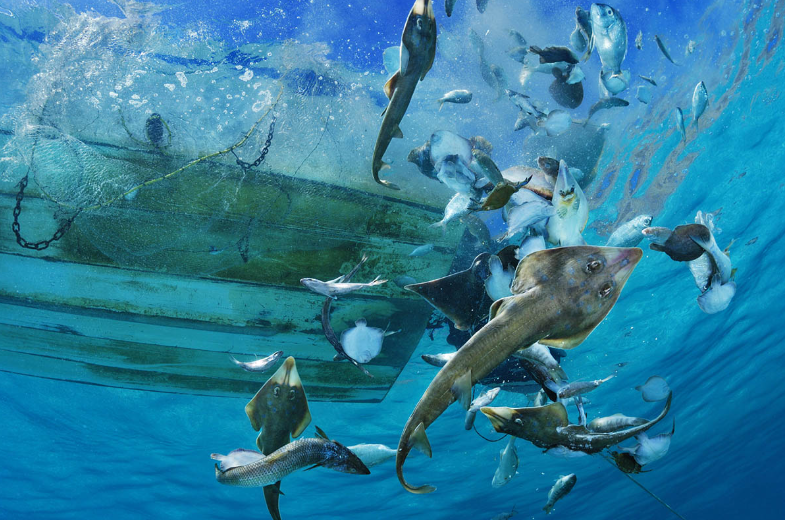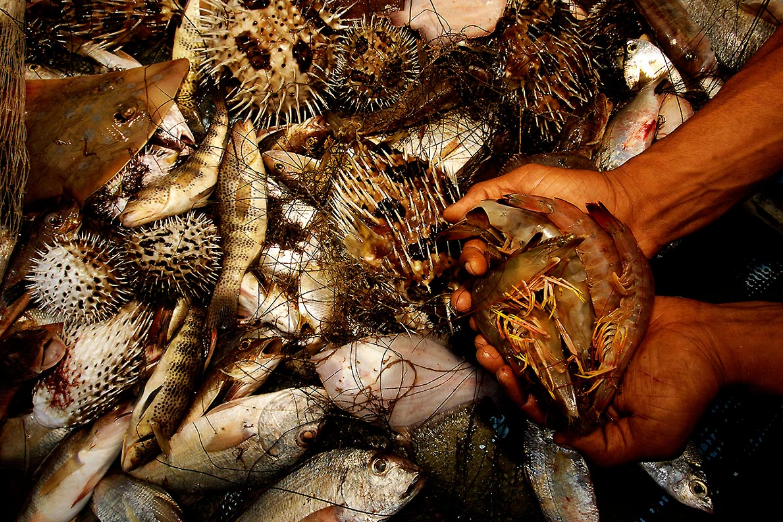 Unwanted fish tossed back into the ocean.Photo: Brian SkerryCommercial fishing creates a mind-boggling amount of waste, at least 7.3 million tons [PDF] annually of discarded fish (“bycatch”) which are either unwanted, illegal to keep, or mangled in the gear. And this number from 2004 is a conservative estimate, not fully accounting for several major fishing countries.
Unwanted fish tossed back into the ocean.Photo: Brian SkerryCommercial fishing creates a mind-boggling amount of waste, at least 7.3 million tons [PDF] annually of discarded fish (“bycatch”) which are either unwanted, illegal to keep, or mangled in the gear. And this number from 2004 is a conservative estimate, not fully accounting for several major fishing countries.
Marine photographer Brian Skerry has some very intense imagery that illustrates this phenomenon, and he’s provided a couple here for your interest (more are at his site: look under portfolios for global fisheries). The first one shows discarded fish raining into the depths from a small vessel: the second shows three shrimp caught in an hour of towing a net in tropical waters: what’s under the shrimp is the incredible pile of unwanted critters which died for that meager handful.
 The bycatch haul for just a handful of shrimp.Photo: Brian SkerryThe good news would seem to be that bycatch rates are falling — except that it’s happening in concert with decreases in landings of “desired” fish, too, so the overall picture of oceanic fish stocks is bleak. Catches have been falling since the 1980s, and will continue without creation of fishing-free zones in the oceans and major cutbacks in harvest rates (via strong reductions of subsidies, likely).
The bycatch haul for just a handful of shrimp.Photo: Brian SkerryThe good news would seem to be that bycatch rates are falling — except that it’s happening in concert with decreases in landings of “desired” fish, too, so the overall picture of oceanic fish stocks is bleak. Catches have been falling since the 1980s, and will continue without creation of fishing-free zones in the oceans and major cutbacks in harvest rates (via strong reductions of subsidies, likely).
There is hope for cutting back on bycatch with the help of simple improvements to fishing gear, which are being catalyzed in part by WWF’s SmartGear competition, an annual contest to encourage innovations that keep sea turtles, birds, marine mammals, cetaceans, and nontarget fish species out of fishing gear such as longlines and nets.
Still, I’d rather see overall harvest rates of targeted species decline for a while by just reducing overall fishing pressure. We’re loving seafood — and the seas — to death.
Thanks to Jennifer Jacquet of the Sea Around Us Project for helping with this post. Check out her excellent blog about marine science and “shifting baselines” here.)



